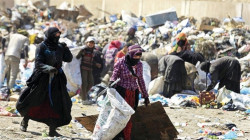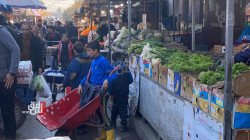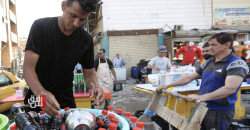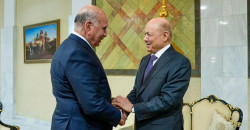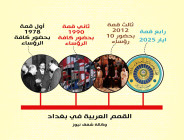Iraq’s humanitarian generosity tests domestic patience

Shafaq News/ Iraq has long embraced a role as a regional benefactor, frequently extending humanitarian assistance to conflict-ridden neighbors such as Gaza, Lebanon, and Syria.
From emergency aid convoys to fuel shipments and refugee absorption, Baghdad’s commitment to regional solidarity has remained steadfast, particularly through 2023–2025. Yet, this altruistic foreign policy has met mounting resistance at home, as critics question the wisdom of overseas generosity at a time of pressing domestic economic hardship.
A Generous Policy in Times of Deficit
During its 47th session in November 2024, Iraq’s Council of Ministers approved a controversial measure allowing for a 1% deduction from salaries, allowances, and pensions of all public sector workers. These funds were earmarked for relief efforts in Gaza and Lebanon—or as deemed appropriate by the Prime Minister. Although officially labeled as voluntary, observers contend that the deduction resembled a compulsory tax on a population already burdened by inflation, service cuts, and job scarcity.
The measure followed a string of aid initiatives. As Israeli military operations intensified in southern Lebanon in late 2024, Iraq mobilized state resources to ship hundreds of tons of aid—including food and fuel—to Lebanon. It also facilitated the entry of around 17,000 Lebanese refugees, offering temporary residency, educational access for children, and emergency medical treatment for dozens of injured individuals.
This aid, however, was not a wartime improvisation. Before the conflict, Baghdad had dispatched nearly 100 fuel tankers to Lebanon, reinforcing an energy-for-services barter arrangement established in 2021. That deal, renewed in March 2025, ensured Lebanese hospitals would continue providing treatment for Iraqi patients in exchange for Iraq’s heavy fuel oil—a fuel which Beirut converts into gas oil to prop up its failing power infrastructure.
In Gaza, Iraq responded to the humanitarian crisis following the 2023 Israeli war by pledging to send 10 million liters of fuel. It also facilitated treatment for injured Palestinians in Iraqi hospitals and delivered hundreds of tons of food and medical aid through coordinated military and humanitarian airlifts.
To Syria, Iraq’s assistance continued after the collapse of Bashar al-Assad’s regime in late 2024. While Baghdad’s involvement remains largely diplomatic, tangible aid has also surfaced: in December 2024, Iraq’s Foreign Minister announced humanitarian shipments to Syrian civilians. By April 2025, nearly 40 truckloads of grain crossed into eastern Syria through the al-Qaim border, a gesture widely viewed as an initial step toward post-Assad engagement.
What the House Needs Comes Before the Mosque
Despite the international goodwill these measures generated, Iraqi lawmakers and analysts have voiced growing concern. At the heart of the backlash lies a perception that foreign policy largesse is being prioritized over domestic recovery. With several provinces still below the poverty line and critical infrastructure—schools, hospitals, power grids—in disrepair, parliamentarians like Jawad al-Yasari argue that the government’s priorities are misaligned.
Al-Yasari and other legislators have called on the executive to channel donations inward—toward Iraqi citizens rather than external recipients. They argue that Iraq's recurrent budget deficits, driven by declining oil prices and an overdependence on public payrolls, leave little room for discretionary foreign spending.
"Some members of parliament reject this government approach through official statements, calling on the government to direct aid and donations to the Iraqi people. However, these objections are ignored by the executive authority, which is why a new parliamentary stance on the matter is expected in the coming days," Al-Yasiri told Shafaq News.
Munaf al-Moussawi, the head of the Baghdad Center for Strategic Studies, further warned of a growing inconsistency in governance. While the state funds foreign relief efforts—sometimes discreetly—it simultaneously requests parents and local communities to finance basic educational needs, such as whiteboards and school benches.
“There’s an imbalance,” al-Moussawi said in remarks to Shafaq News. “People are donating out of goodwill to other nations, but the government should not be doing so while neglecting its own schools and hospitals.”
He believed that there is a “double standard” in the government's approach—"while it keeps the volume of aid it sends abroad secret, the government simultaneously asks for donations to schools to cover shortages, claiming it cannot afford to buy desks, whiteboards, and other basic school supplies."
The criticism underscores a deeper tension in Iraq’s post-conflict reconstruction. Even as oil revenues increasingly go toward salaries, little is left for capital investment. The country’s industrial base remains stagnant, while plans for revitalizing agriculture or rebuilding factories have seen minimal traction.
Strategic Depth or Economic Gamble?
From Baghdad’s perspective, this foreign aid serves broader strategic goals. Iraq’s leaders aim to reinforce regional partnerships, build influence, and project soft power at a time when regional alignments are rapidly evolving. The country’s hosting of the 34th Arab League Summit in May 2025 signals its ambitions to reclaim a diplomatic leadership role after years of internal instability.
But these ambitions may come at a price. Economists warn that generous foreign aid without corresponding internal reforms could deepen Iraq’s structural vulnerabilities.
Public trust in the government has already been eroded by perceived mismanagement and a lack of transparency in financial decisions. As economic pressures mount and political opposition grows louder, Baghdad risks igniting domestic unrest.
Ali al-Nasser, a regional affairs researcher, suggested Iraq’s aid policies are partially driven by external pressures. “These donations aren’t just about charity,” he told Shafaq News. “They reflect political obligations and strategic hedging. But without a solid economic base, such diplomacy becomes a liability.”
He explained that as a result of the current drop in oil prices, revenues are now only sufficient to cover employee salaries, without meeting investment costs—despite the urgent need for such investments to revive Iraq’s economy, including the restoration of factories, industrial facilities, and infrastructure.
"Iraq has been under significant and ongoing pressure for some time, and it is these pressures that compel the country to offer aid. However, strengthening ties with other nations through such economic policies is unwise and could push Iraq into a steep decline and dangerous slide in its economic situation."
The Fine Line Between Altruism and Overreach
Experts say that balancing regional leadership with domestic stability will require a recalibration of strategy. “Transparent spending, evidence-based policymaking, and investment in national development must go hand in hand with international assistance. Otherwise, Iraq’s generosity risks being seen not as a strength—but as a costly overreach,” Al-Yasiri concluded.
